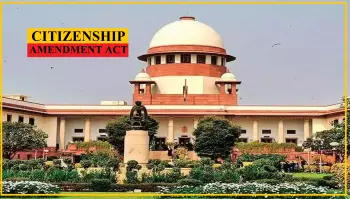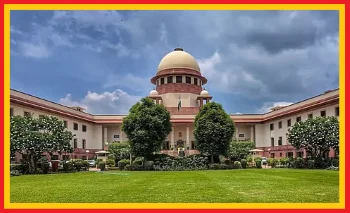The Citizenship Amendment Act
New Delhi 12 Jul, 2025- The Citizenship Amendment Act (CAA) is once again under the legal spotlight. During the last hearing on 11 Jul 2025 (Friday), The Supreme Court of India has directed the Union Government of India to submit a revised and detailed affidavit responding to a new wave of legal petitions questioning the validity of constitutional law.
During a hearing on July 11, a bench of three-judge headed by Chief Justice D.Y. Chandrachud, issued the fresh order, mentioning that the recent submissions has raised fresh constitutional concerns. — highlighting fears that the law discriminates by religion and threatens the foundational secularism of the Republic of India.
The CAA: Law with Remaining Questions
The Citizenship Amendment Act was passed by the Centre as a humanitarian initiative in December 2019. This act is offering Indian citizenship to non-Muslim migrants including Hindus, Sikhs, Christians, Buddhists, Jains, and Parsis, escaping from Pakistan, Afghanistan, and Bangladesh due to religious harassment.
However, The Citizenship Amendment Act, immediately drew criticism from across the political and civil spectrum. Nationwide Protests against this act erupted. Detractors argue it as a violation of Article 14 of the Constitution, which guarantees equality before the law. They assume the Act as an attempt to redefine India’s secular identity. by making religion a criterion for citizenship.
The Government has repeatedly defended the Act as a necessary protection for minorities of neighboring countries facing religious persecution. However, critics viewed it as inherently discriminatory and warned it could set a troubling precedent.
⚖️ Court Calls for Updated Government Stand
During Friday’s hearing, the Supreme Court of India asked the Government to provide a detailed update, specifically seeking clarity on why Muslims were excluded under the law and how such provisions align with the Constitution’s fundamental values.
The bench of judges made it very clear that citizenship laws must follow the Constitution of India. They further stated that any rule that affects people’s rights and identity should be judged fairly and must respect the principles of equality and secularism.
The next hearing on this act has been scheduled on 05th August 2025 seeking the fresh and detailed response from the Indian Government.
Strong Reactions from Political Parties
The court’s action has sparked fresh political discussion, amongst the critics and the opposition. INDIA bloc has welcomed the decision of Supreme Court and stated that it is a positive step to uphold and safeguard the country’s diverse values.
Congress leader Jairam Ramesh took to social media, saying, “The judiciary is once again stepping up to protect the Constitution. The CAA must be reviewed in light of India’s founding ideals.”
The ruling Bharatiya Janata Party, however, has stood firm in the support of this law. Party spokespersons restated that this Act does not take away anyone’s citizenship but it is intended only to provide shelter to those escaping religious persecution from neighboring countries. Government has consistently upheld since the beginning of law’s enactment.
What Comes Next?
Legal experts believe the Supreme Court’s insistence on a fresh affidavit suggests it is preparing to examine the Act more deeply. If the government’s justification is found to be insufficient or contradictory, the court could opt to place the matter before a broader constitutional bench for deeper examination.
The CAA’s fate now rests on how convincingly the government can defend it in legal and moral terms. As the next hearing approaches and public attention intensifies, the future of the law — and its broader impact on India’s democratic identity — remain uncertain but critically important.

🧾 Conclusion
The Supreme Court’s move to revisit the Citizenship Amendment Act places a vital question back at the centre of national discourse: Can citizenship laws reflect compassion without compromising constitutional equality? As the court prepares to hear the matter again on 5th August, the Centre will need to offer more than just legal reasoning — it will have to defend a vision of India that aligns with its democratic and secular roots. The debate over the CAA is no longer just about legality; it’s about the kind of country India aspires to be.
❓ Frequently Asked Questions (FAQ)
🔹 Q1. What is the Citizenship Amendment Act (CAA)?
A: The Citizenship Amendment Act (CAA) is a law passed in 2019 that provides a fast-track pathway to Indian citizenship for non-Muslim migrants from Pakistan, Afghanistan, and Bangladesh who arrived before December 31, 2014. It has faced criticism for allegedly violating India’s secular principles by excluding Muslims.
🔹 Q2. Why did the Supreme Court seek a fresh affidavit from the Centre on the CAA?
A: The Supreme Court directed the Union Government to submit a fresh affidavit in response to new petitions challenging the CAA’s constitutionality. Petitioners argue that the law discriminates based on religion and contradicts the secular values protected in the Indian Constitution.
🔹 Q3. What will the Supreme Court review in the upcoming hearings?
A: The court will review whether the Citizenship Amendment Act is consistent with constitutional principles, especially Articles 14 (Right to Equality) and 21 (Right to Life and Liberty). It will also examine the rationale behind excluding Muslims from the Act’s provisions.
🔹 Q4. When is the next Supreme Court hearing on the CAA scheduled?
A: The next hearing is scheduled for August 5, 2025, when the court will consider the Centre’s detailed response and the fresh legal arguments presented by petitioners.
🔹 Q5. Has the CAA been implemented nationwide?
A: As of July 2025, the CAA has not been fully implemented across India due to pending legal challenges. However, the government maintains that it is a necessary humanitarian measure and plans to move forward following legal clearance.
🔹 Q6. What are the criticisms against the Citizenship Amendment Act?
A: Critics argue that the CAA:
- Discriminates on religious grounds
- Excludes Muslim refugees
- Violates the secular nature of India’s Constitution
- May lead to further communal tensions and legal uncertainties
🔹 Q7. What is the government’s defense of the Citizenship Amendment Act?
A: The government claims the CAA is a humanitarian initiative to help persecuted minorities in neighboring countries. It asserts that the law does not affect the citizenship rights of Indian Muslims or any Indian citizens.
🔹 Q8. Does the CAA affect Indian Muslims or existing Indian citizens?
A: No, the government has clarified that the CAA does not impact the citizenship status of any existing Indian citizens, including Muslims. The law applies only to undocumented non-Muslim migrants from Pakistan, Afghanistan, and Bangladesh who entered India before December 31, 2014.
🔹 Q9. How is the CAA different from the NRC (National Register of Citizens)?
A: The CAA and NRC are separate initiatives. The CAA deals with granting citizenship to specific groups of migrants, while the NRC is a registry intended to identify illegal immigrants. Critics fear that if combined, the CAA and NRC could disproportionately affect Muslim residents, but the government maintains there is no official link between the two at this stage.
🔹 Q10. Could the CAA be struck down by the Supreme Court?
A: Yes, if the Supreme Court finds that the CAA violates fundamental constitutional principles such as equality, secularism, or non-discrimination, it has the authority to strike down or ask for changes to the law. The outcome will depend on the legal arguments, evidence presented, and the court’s interpretation of the Constitution




